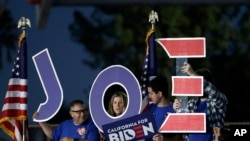Many Democratic voters in Super Tuesday's presidential primaries made up their minds just before casting a ballot — and Joe Biden appears to be benefiting from their indecision.
Late deciders in Alabama, North Carolina and Virginia broke for Biden, helping the former vice president win those states and capitalize on new momentum in the race for the Democratic presidential nomination. Sen. Bernie Sanders secured his home state of Vermont and Colorado, where voters were more likely to be liberal.
The share of late deciders ranged from about a quarter of voters in Texas to roughly half in Minnesota, according to AP VoteCast surveys of voters in several Super Tuesday contests. Moderate and conservative voters in each state were slightly more likely than their liberal counterparts to delay a decision to the last minute.
The indecision shows voters grappling with their choices and reluctant to throw away their votes in a race that is changing quickly. Biden's big win in South Carolina on Saturday revived his struggling campaign and helped push three of his rivals toward the exit.
But Biden must also block Sanders with his constituency of young liberals, box out Sen. Elizabeth Warren and overcome the hundreds of millions spent by billionaire Mike Bloomberg — who is on the ballot for the first time Tuesday. Further complicating the possible outcomes on Tuesday was that many people voted early, likely to be a major factor in California, the night's biggest delegate prize.
Here's a snapshot of Democratic voters in Alabama, California, Colorado, Massachusetts, Minnesota, North Carolina, Texas and Virginia — who they are and what matters to them — based on preliminary results from AP VoteCast surveys, conducted for The Associated Press by NORC at the University of Chicago. Additional polling results will be added throughout the night.
BIDEN
The former vice president fared well among centrist voters. He channeled sentimental attachments to former President Barack Obama. And a campaign that seemed to be struggling a week ago enjoyed significant advantages among voters older than 45, African Americans, women and college graduates.
About half of North Carolina voters wanted a president who would restore politics to a pre-Trump era — and Biden won the majority of this group.
He cleaned up in Alabama by winning about 60% of African Americans, a majority of Democratic voters in that state.
Biden also flashed some crossover appeal. In Virginia, a state likely to be a top battleground in November, Biden won about 40% of voters who say they voted in the 2016 Republican primary. Bloomberg won about 20%.
SANDERS
The Vermont senator is holding on to his coalition of liberal voters and people under 30. That was enough to make him competitive in a state such as Massachusetts, where 45% of voters consider themselves liberal.
But there were clear limits to his appeal in states across the South. Sanders lost in Virginia and North Carolina, where just about 40% of voters were younger than 45. And no more than 40% in those states described themselves as liberal. In Alabama, he won just about 10% of black voters.
Aside from their youth, Sanders supporters stand out for their skepticism of most other candidates in the race. About half of his voters in North Carolina said they would be unhappy with Biden or Bloomberg as the nominee. Majorities of them in Virginia felt the same.
BLOOMBERG
More than $500 million in spending on ads could not buy Bloomberg much love.
Bloomberg fared better among voters older than 65 compared with those younger, and similarly among those who think of themselves as moderate or conservative more so than liberals. But even among these groups, he was edged out by Biden.
The former New York mayor was the Democrat voters were least enthusiastic about nominating.
About 60% of voters in Minnesota, Colorado and Massachusetts — his birthplace — said they would be dissatisfied if Bloomberg was the Democratic candidate. Roughly half in North Carolina and Virginia would also be displeased. By comparison, majorities in each of those states said they would be satisfied if Sanders was the nominee.
Only in Alabama and Texas would a majority be satisfied by Bloomberg.
MODERATES AND CONSERVATIVES
Moderates and conservative accounted for the majority of Democratic voters in most of the eight states, just as they have in previous contests in Iowa, New Hampshire and South Carolina.
Those primary voters also generally preferred a presidential candidate who would pursue practical centrist policies rather than one who would champion bold liberal policies.
Still, roughly half of voters, or more, in each state indicated they wanted to see a candidate who would fundamentally change how the political system works in Washington over one who would return the political system to the way it was before President Donald Trump was elected.
LOOKING TOWARD NOVEMBER
The Democratic contests do appear to be drawing some potential swing voters. Roughly 20% of voters or more said Democrats haven't locked in their vote and are waiting to see who wins the nomination before deciding how they'll vote in November. That was true in seven of the eight states AP surveyed. The share was smaller — about 1 in 10 — in Minnesota, a state Trump is trying to flip.
Most of this group identified as moderates or conservatives, a sign that they might be open to Trump or consider not voting for any candidate in November.




